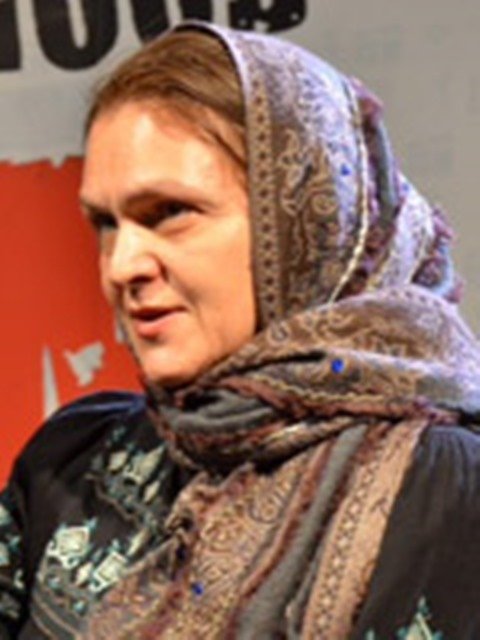‘The unrest seeks to distract Turkey’s attention from Syria’
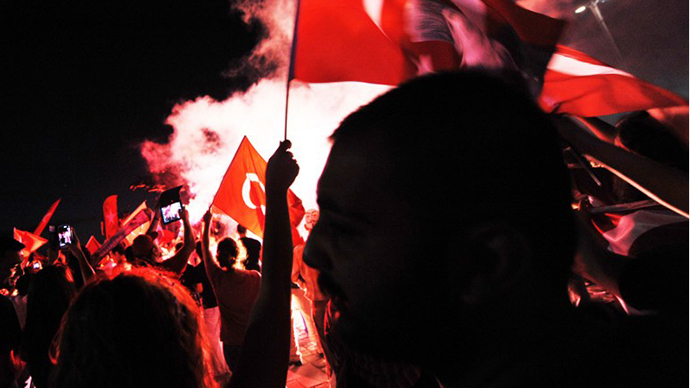
The documents about provocateurs, organizers and managers of the Turkish protests will be published soon, said Prime Ministerial advisor Mustafa Şentop, the person in charge of drafting the new Turkish Constitution, told RT.
Sentop is a law professor, and
Deputy Chairman of the Justice and Development Party, member of
the Constitution drafting committee, and MP for Istanbul. He told
RT how the ‘interest-rate lobby’ had been preparing the coup
since 2009, why the main street cannot change power in Turkey,
and why exactly the media are to blame.
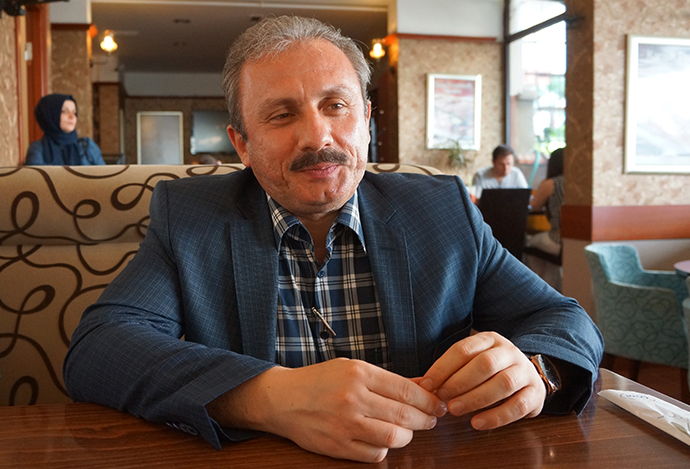
Q:What is the new Constitution all about? Do you have any agreement with the US on revamping it?
A: Let me first say that Turkey does not tolerate any foreign interference whatsoever, including the US, into these matters. Under no circumstances can the draft Constitution be discussed with the United States or the European Union.
The new Constitution is a need that the JDP has recognized since
it came to power in 2002. On May 27, 1960, Turkey saw a military
coup, which ushered in a new constitutional order. In this order,
most decisions were taken by the military and bureaucracy rather
than politicians. They would do what they wanted behind the back
of the elected politicians, who were, in fact, figureheads. The
politicians themselves raised little objection.
Ever since the JDP came to power in 2002, it has been working
hard to turn the tide. If national sovereignty rests with the
people, and the people vest the powers to exercise this
sovereignty to politicians by electing them, these politicians
must stand for these powers, whatever happens.
Q:Is it true that Erdogan referred to Turkey's constitution as a document written by “two drunks”?
A: He was not talking about the Constitution. The Parliament had passed a law to limit alcohol sales at certain times of the day – a restriction that is in fact far more lenient than in Europe, let alone several American states. What we wanted is stop people from buying and selling spirits at night, as well as outside mosques and schools. When we put forward a bill, you speak against it, but when some MPs suggest discussing other laws on free sales of alcohol, you adopt them – that’s what the Prime Minister was saying. He used the popular expression ‘the two drunks’ here.
Q:Let’s go back to the Constitution that will make the President electable by a popular vote….
A: The JDP is an unyielding advocate of national sovereignty. This is why we came up with a new draft Constitution. Since 2002, we have initiated a whole number of political reforms to transform the system founded back in 1960, after the coup.
Another important step was marked by the 2010 referendum, which
adopted quite a few constitutional amendments.
The new draft is supposed to be an upgraded and updated version
of the Constitution. It will draw a legislative line under what
we have achieved so far.
The new Constitution draws from the premise that if the sovereignty belongs to the people, everyone in power has to lean on it. No constitutional powers can be….
Those who are appointed to their offices must be accountable to
those who are elected. Our goal is to give politicians control
over bureaucrats, not vice versa. We believe this is what true
democracy looks like.
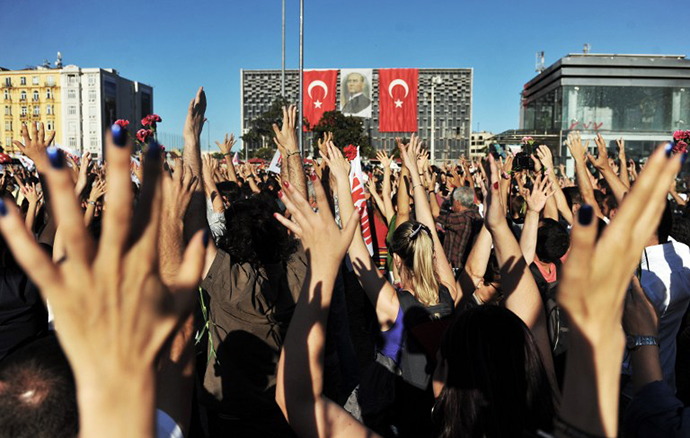
Q:Do the events at Taksim have anything to do with the new Constitution?
A: About three or four months ago we started receiving reports that something like that was under way. There are foreign governments directly engaged into this – we can tell that by the media coverage.
For instance, on June 16 Kazlıçeşme Square saw a rally of around 1.5 million JDP supporters – one of the biggest rallies in human history. They had gathered to back the ruling party and the Prime Minister.
Meanwhile, CNN covered the event, calling it an anti-government protest in Turkey. Just like the BBC, Reuters, the German media, they spread false rumors about our country. We are free to call most of these media the Israeli lobby, because they are funded by Israel. They all offer a rather one-sided, negative coverage of the events in Turkey. When 52 people were killed in Reyhanlı, the CNN only briefly mentioned it in its news ticker. But when the initially peaceful events at Taksim started unfolding, the CNN gave non-stop live broadcasts from the place. It was a clearly an orchestrated scheme.
Q:Is this scenario aimed at distracting Turkey’s attention from Syria or involving it even more? Or, perhaps, there is another objective?
A: I think there is another objective. Turkey became stronger throughout the rule of the JDP under the leadership of Recep Tayyip Erdogan. The GDP growth of Turkey is 3 per cent, and this is the result of the year’s first quarter only. For instance, the average growth rate across Europe is negative. So Turkey has a stable economy against the background of economic decline in a number of countries.
Another issue is that Turkey has become a strong regional player in international relations. That is why I believe that by causing turmoil and instability inside the country they were trying to make Turkey focus on its domestic affairs so that it wouldn’t be able to participate in the settlement of the Syrian crisis. Turkey is concerned about a successful resolution of the problems in Syria, which is obvious – it is our neighbor we share our longest common border with, and in some places this border cuts across villages.
Yesterday I got a phone call from my former student who had gone to the wedding of his relatives that took place in Mardin.
Part of the relatives live on the Turkish territory and they were detained by the military police while crossing the border with Syria for they didn’t have their passports with them. I called their boss, told him about the wedding and explained the situation asking him to help. I hope they finally made it to the wedding.
So the relations between Turkey and Syria are extremely different from relations with the USA, Russia or Germany. The long frontier implies security problems.
Turkey is a country that is directly affected by the Syrian problems, so we are more than others looking forward to their soonest settlement. If there is an international conference to be held on the issue – Turkey must be granted the greatest voting power. The clashes take place right before the Geneva talks between the envoys of the UN, Russia and the USA, so they are aimed at weakening the positions of Turkey.
Q:In this case, since you know Russia participates in the talks and has a different viewpoint on the Syrian problem as compared to the West, do you consider it as one of the instigators?
A: No, we don’t think Russia has a hand in the Taksim unrest.
Q:Then who are the instigators in your opinion?
A: External forces have their branches inside Turkey. The growth and stabilization of the Turkish economy had a negative impact on those groups that had raised money on high interest rates on the national debt. Financial speculators are no longer able to make mega-profits. In 2002 they gave us loans at 63 per cent. Since then, we’ve pulled down interest rates to 4.6 per cent in May 2013.
If we had continued taking money at those high rates, we would
have paid this “interest-rate lobby” some 642 extra billion
dollars. Thanks to Recep Tayyip Erdogan, that money was invested
and not given away for paying the interest rates. Surely, there
are some groups that can’t earn as much as they used to, so they
are dissatisfied with the JDP’s and Erdogan’s course.
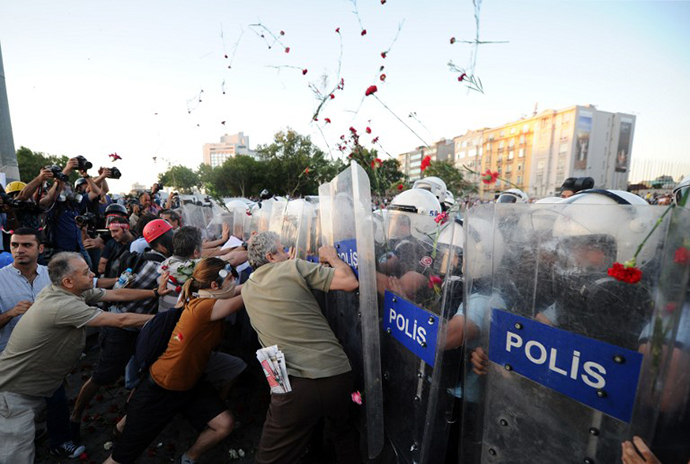
Q: Why did this “interest-rate lobby” – as Erdogan put it – decide to take action now?
A: We know that the first preparations for the Taksim events cropped up in 2009. How can you overthrow the JDP? The JDP came to power after the election in November 2002 with 34 per cent of the votes. In 2003 the Ergenekon organization made its first attempts to overturn Turkey. In April 2007 the parliament was to elect Abdullah Gül president, but the military interfered and posted an “E-memorandum” on their website, after which the Constitutional Court scrapped the results of the election. The JDP responded with a statement as well, in which it said that the army should obey the government and the president elected by the people. It was an unprecedented case in Turkish history – as the government used to resign after such statements before. That was a positively stubborn policy of the JDP, which was not typical for the established political relations in the country.
Moreover, we carried out two reforms back then. First, we introduced amendments to the Constitution, according to which the president was elected by the people – not by the parliament. Second, we decided to hold snap elections in July this year, which is four months earlier than usual.
Many people in media, business, military, and banks believed that
the JDP won just by chance, and expected it to lose in the next
election. However in summer 2007 the JDP won 47 percent of the
vote; and then the president was elected. In 2008, the
Constitutional Court attempted to close the JDP. Six people voted
for, and five people, against. They were just one vote short of
overthrowing the legitimately elected party.
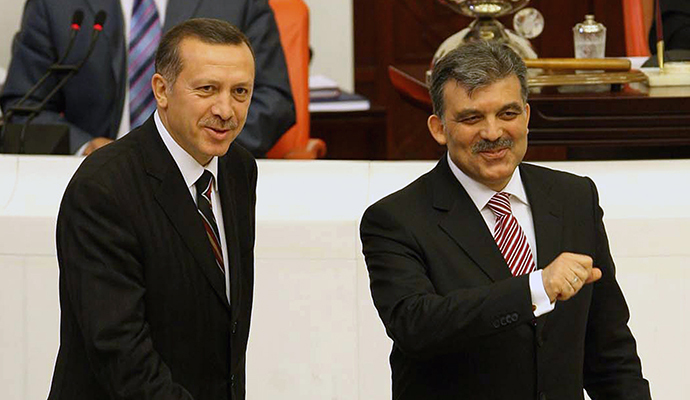
By telling this I just want to demonstrate that the struggle
against our party never stopped since its very first
victory.
In 2010 our party continued working on democratizing Turkey, and
proposed the constitutional reforms to the referendum. The main
thing that changed was that from then on, the army and the
bureaucracy would be headed by those popularly elected. Another
amendment was that four out of 17 Constitutional Court members
are now elected by the Grand National Assembly, whereas in the
past, they had been appointed by the president.
Consequently, today’s Taksim events are an attempt of overthrowing the JDP’s authority by those who had been trying to disrupt it all these years. In 2011, the party won almost 50 percent of the vote. Its opponents cannot win by supporting other political parties in the elections. Powers within the state such as army and bureaucracy have also lost their positions so they no longer can compete with us. So the decision was made to use revolutionary technologies. They put forward the groups not supported by any political parties so that they would cause unrest, make an appearance of instability, and disrupt the JDP.
I recently read a study that described an experiment on group management. In a group of 20 strangers, there are 3 people who know each other and how they were given a particular task by the organizers. They end up easily leading all the others in just 10 minutes. In campaigns like that, people with good, naïve intentions don’t even notice that they are easily managed by organized individuals who have clear political objectives.
In this country, they decided to try out the Arab spring scenario of the Middle East, or the Velvet revolution scenario of the post-Soviet space. But it will not work in Turkey; we will not let it happen.
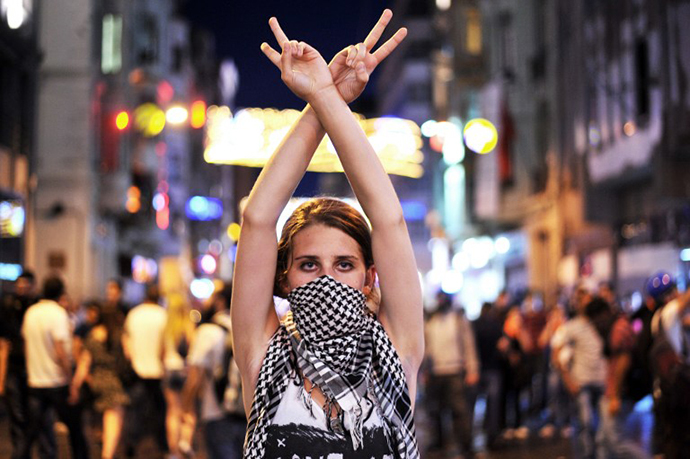
Q:What’s the difference between the situation of Turkey and that of the Arab countries?
A: Unlike Turkey, those countries never had democracy, and their people could never change the authorities by elections. So they went out into the streets and used those methods because they had no other means. But Turkey is a democracy. We have free elections, and since 1950 there haven’t been any doubts in their fairness. Those unhappy with authorities can change them by elections.
It is absolutely wrong to see any relationship to the events in Egypt or Tunisia. The Gezi Park rally can be compared to environment activists campaigns in Western countries. Arguably, the environment was the pretext to start it. At the same time, our situation is different from such countries as Spain or Greece where people protest because of the economic recession and unemployment. We don’t have such problems in our country. There are no common or individual problems which would make people feel the need to go out in the streets of Turkey.
Essentially, the announced rally objectives and their real implementation strongly contradict each other. For the sake of six trees, they already caused $100 mln worth of damage, and ruined plants, flowers, and landscaped areas. They burned municipal buses, destroyed banks, broke windows, and so on. This is no longer a peaceful protest when people throw stones, balls studded with nails, and Molotov cocktails at police.
For instance, last week there were protests against the G8 summit in London where police also used force and detained 52 people even though demonstrators carried neither stones nor Molotov cocktails.
This way we can see that campaigns have been organized by those domestic and international circles that aren’t happy with the JDP policies and with the fact that Turkey’s growing stronger. We have the corresponding documents which will be presented in court.
Q:What documents do you have?
A: We have information about those who provoked and organized these protests, and provided logistics, funds and other resources.
As an example, New York Times published an ad on protests. A campaign was organized to pay for it, and $40.000 out of $100.000 was covered by Rafagen, a US pharmaceutical company of Israeli origin. This information was found in open sources. The documents we have will be made public in the near future.
In conclusion I want to say that Turkey has already survived military coup attempts, the “E-memorandum”, presidential election deadlock, and the JDP closure cases. The same way, we will survive this phase as well. Turkey is strong enough to make it.
Q:President Morsi terminated Egypt’s diplomatic relations with Syria. Many consider it a declaration of war. How does Turkey view it?
A: Egypt is an important actor in this region, along with Turkey and Iran. Egypt could’ve been more strongly involved in the Syrian conflict had it not been so busy with its own domestic issues. We believe Egypt has taken the right position which would be able to impact on the situation.
The statements, views and opinions expressed in this column are solely those of the author and do not necessarily represent those of RT.
The statements, views and opinions expressed in this column are solely those of the author and do not necessarily represent those of RT.
